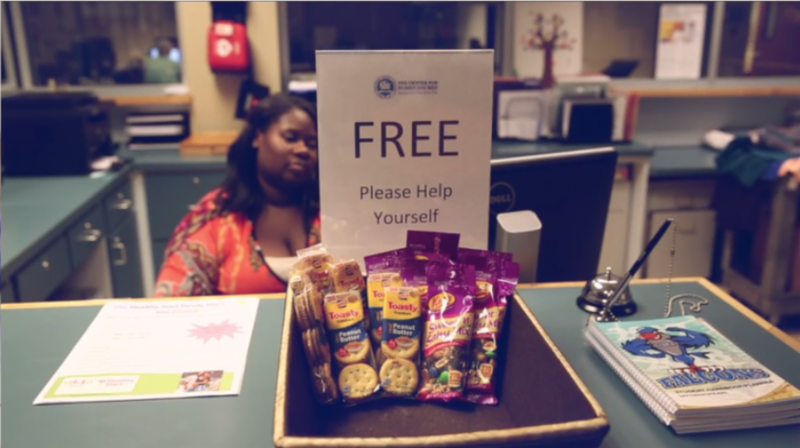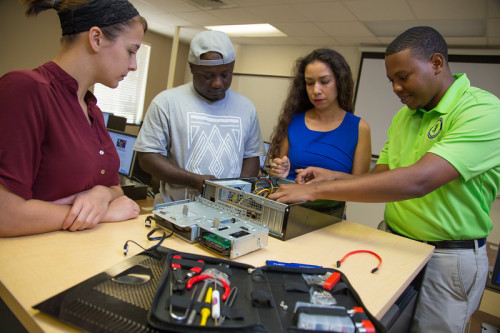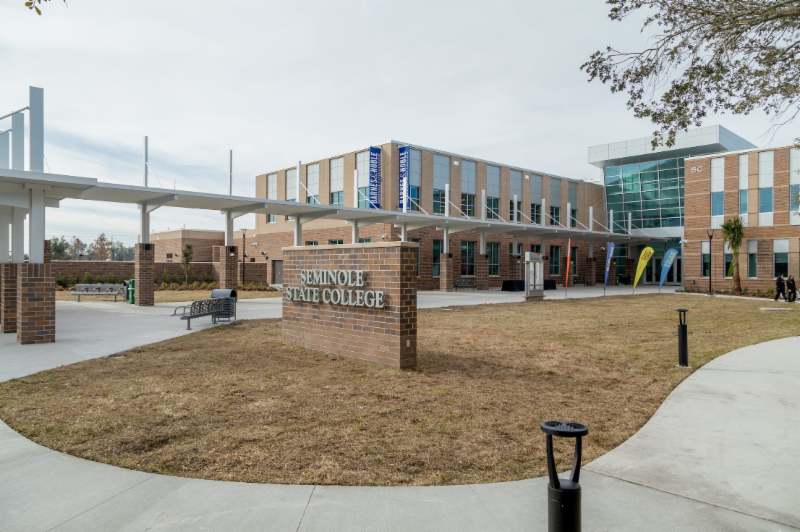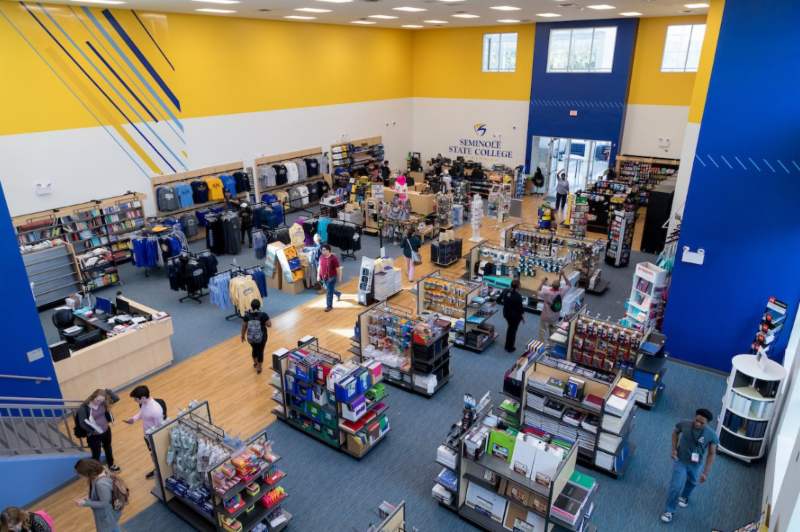|
|
|
Message from Chancellor Madeline Pumariega
|

Florida's community and state colleges have changed the lives of tens of millions of Floridians by providing a path toward social mobility-opening the door so that all students, including underserved students, have the opportunity to move from poverty to prosperity.
The connection between education and prosperity is direct and powerful. A high school diploma is simply not enough to close the skills gap in high-growth industries and the increasing need for a larger workforce in science, technology, engineering and math. Further, 63 percent of jobs being created nationally require a postsecondary credential, according to the Georgetown University Center on Education and the Workforce. As demands arise, colleges pivot to provide the talent pipeline needed to fill job positions.
As reported by
Florida College Access Network, of recent high school graduates who do not continue their education, only half are working by the following fall and earn less than $8 an hour on average. Those with an associate degree earn 18 percent more than those with a high school diploma. With a bachelor's degree in hand, a worker earns 50 percent more. A majority of those who entered the workforce directly out of high school would reconsider their choice and opt to attend college; comparatively, 90 percent of students who went to college immediately following high school would make the same choice, according to CollegeAtlas.org.
As stated in this recent
Orlando Sentinel article written by Nicole James, an adjunct political-science instructor at Eastern Florida State College, students pursuing a higher education gain the knowledge and experience needed to bring value to their work, family, community and more. These students help create the talent pipeline needed in today's increasingly competitive workforce. For many, their path to the workforce in Florida is through one of our 28 colleges.
Our colleges are responding to the needs of students, community and industry leaders by focusing on affordability strategies that ensures students have access to a high-quality, affordable education at one of 28 Florida College System (FCS) institutions. Last year alone, our colleges provided more than 75 million of institutional aid directly to students, as well implemented a host of textbook affordability strategies.
Teaching and learning strategies are critical to ensuring the development of high-quality academic programs and positive student experiences. FCS institutions have developed innovative strategies that strengthen student pathways throughout their college experience and ensure that students receive support services to be successful. Student success is evident through the increase in completion and retention rates, as well as through performance incentive programs the colleges have implemented.
College navigators and advisors help students make informed decisions to take only the courses needed for their career. Faculty members redesigned and aligned courses in the area of mathematics and English in a way that helps students balance life responsibilities while staying on track with their educational aspirations.
Florida's 2 +2 articulation policies have been nationally recognized as the best in the country and replicated by other states. A 2+2 work group focused on strengthening those pathways will explore how we can enhance the transfer experience and success for students. Building on statewide policy, many community and state colleges have developed targeted articulation pathways with universities. Today, Florida leads the country with the percentage of students who graduate with an Associate in Arts degree before transferring to a university to pursue a baccalaureate degree.
The link between college attainment and economic growth is strong. Florida is currently working toward increasing the number of those earning post-secondary certificates or degrees from the current 47 percent to 55 percent by the year 2025. The goal of the Rise to 55 movement is to produce a more talented and educated workforce so employers have the resources they need to grow their businesses to create a stronger economy and more robust communities across the state.
When it comes to workforce partnerships, Florida's community and state colleges continue to be innovative in working with industry leaders to meet community and workforce needs. The global competitiveness of today's workforce forces many workers to re-train or retool their job skills through furthering their education. FCS institutions, together with local CareerSource boards, chambers and economic councils, develop workforce programs that continue to meet the demanding needs of their community in a global economy.
Madeline Pumariega
Chancellor
|
|
|
|
Addressing
Homelessness
and Hunger at Daytona State College
|
Daytona State College (DSC) is addressing student homelessness a
nd
h
ung
er t
hro
ugh its
one-stop location for resources and services. The Center for Women and Men, a department within Student Development, pr
ovides students facing homelessness the support needed to help remove barriers to their education and further their ability to succeed.
A homeless student visiting The Center can access DSC's food pantry, a clothing closet for both women and men, laundry vouchers, backpacks and school supplies, free printing, and a textbook lending library. Bus passes, housing resources, free hair and skin care, access to free healthcare for students and their children, employment, and childcare assistance with DSC community partners are several resources that are also available to students. Additionally, each student is given a faculty mentor who continues to support and guide the individual throughout his/her college experience.

"This population of stud
ents is more likely to drop out," said DSC President Tom LoBasso. "By addressi
ng these needs, DSC will help them achieve their fullest potential."
This program is funded through private donors with the help of the DSC Foundation, as well as student help within the Student Government Association. DSC students voted unanimously to donate a portion of collected student fees to the initiative each year. As a result of the students' generous support, there is no cost to DSC to fund the program.
Results from a survey administered by the Association of Community College Trustees in partnership with the Wisconsin HOPE Lab and the Kresge Foundation showed that almost thirty percent of DSC's
student body has faced homelessness or housing insecurity with even more facing food insecurities.
In 2017, The Center for Women and Men served students with 33 homeless/housing resources, 69 tuition waivers, 66 food pantry visits, 415 falcon fuel grab and go snacks, 61 bus passes, five backpacks and three laundry vouchers. The Center serves students across seven campuses within Volusia and Flagler counties.
To hear more about the impact The Center makes on DSC students, click here.
|
|
Grant Will Give Minority Students in Tampa Bay Greater Access to STEM Degrees
|
 A new "bridge" is underway in the Tampa Bay area helping underrepresented minority students move into high-demand baccalaureate programs in Science, Technology, Engineering and Math (STEM). A new "bridge" is underway in the Tampa Bay area helping underrepresented minority students move into high-demand baccalaureate programs in Science, Technology, Engineering and Math (STEM).
The Tampa Bay Bridge to the Baccalaureate (TB-B2B), a partnership between St. Petersburg College (SPC), Hillsborough Community College (HCC) and State College of Florida, Manatee-Sarasota (SCF), received a $1.5 million grant from the
National Science Foundation, under its Louis Stokes Alliance for Minority Participation (LSAMP) program, to increase the number of minority students transferring into a STEM program at the University of South Florida (USF).
Every year, the TB-B2B partner institutions usually see more than 400 of their minority students transfer into STEM programs at a four-year university. Over the three-year grant period, the colleges will work collaboratively to increase that number by 50 percent and provide students with opportunities to pursue baccalaureate degrees in STEM fields.
"We are so honored to be a part of this partnership, which will give underrepresented, minority students opportunities to pursue baccalaureate degrees in STEM fields leading to high-wage jobs that can help end generational cycles of poverty," said Dr. Tonjua Williams, President of SPC.
Connections among program leaders and faculty at the institutions will help the colleges achieve this goal, especially through USF's
FUSE initiative, a guaranteed admissions program for students who complete their associate degree at a participating Florida College System institution.
"We look forward to partnering with the program leaders and faculty on new efforts that will increase access and broaden participation of underserved students in STEM," said Bernard Batson, Director of Diversity and Inclusion Programs at the USF College of Engineering.
TB-B2B students will engage in undergraduate research and gain hands-on experience through various opportunities, ultimately increasing their research knowledge base and exploration of STEM careers. Individuals with a four-year STEM degree earn higher wages, according to the U.S. Department of Commerce. Compared to their non-STEM counterparts, STEM workers earn about 30 percent more.
"A diverse scientific and technical workforce is critical to America's future, and this alliance supports that goal," said HCC Dean of Mathematics and Sciences James Wysong.
According to the
Tampa Hillsborough Economic Development Corporation, Tampa Bay is becoming the epicenter of STEM industry and innovation within Florida and ranks as one of the state's leading technology hubs. Enterprise Florida estimates that 15 out of the 20 fastest growing job fields will require a STEM education and predicts the need for 120,000 new STEM workers by 2018.
"We are delighted that the National Science Foundation has funded this Louis Stokes Alliances for Minority Participation consortium grant," said SCF President Dr. Carol Probstfeld. "In our region and throughout the state, there is a critical need for a well-educated workforce with degrees in a STEM field."
|
 |
|
Students and first responders at Polk State College will now receive enhanced lifelike trauma care training as a result of a recent grant from CSX.
CSX, one of the nation's leading transportation suppliers, awarded Polk State College Foundation $4,485 to purchase Terry Trauma manikins for the
Emergency Medical Services Program's First Responder Filed-Based Training Project. As part of the project, the program will train 1,300 current and future paramedics, emergency medical technicians, and emergency medical responders.
"The manikins will allow us to offer superior simulation of realistic experience public safety personnel are exposed to including lacerations, burns and broken bones," said Polk State Emergency Medical Services Program Director Don Guillette.
Training will include rescue, extraction, immobilization, and restraint scenarios, as well as three National Association of Emergency Medical Technicians (NAEMT) continuing education courses taking place at the Polk Sate Center for Public Safety.
Awards granted by CSX are through its Beyond Our Rails program, which focuses on four areas including safety, community, environment and wellness. Polk County is home to the CSX Central Florida Intermodal Terminal in Winter Haven, the Winston Yard Tower in Lakeland, and various rail lines.
"Polk State's First Responder Field-Based Training Project illustrates the College's dedication to providing relevant, cutting-edge workforce training," said Dr. Angela Falconetti, Polk State College President. "Our current and future first responders will be well prepared to protect our community through the lifelike experiences they gain in our program."
|
John Markham - Daytona State College
John Markham is a student at Daytona State College (DSC) pursuing an Associate in Arts (A.A.) degree. Markham is a leader in emergency preparedness programs and activities, is an Eagle Scout, and has served on the FEMA Emergency Council. Additionally, Markham serves his community through volunteering for the W.T. Bland Library in Mount Dora, participating in conservation-related projects at Camp LeNoche, and assisting with a landscaping service project at Camp Challenge. Markham earned the James M. Stewart Citizenship Award for exemplifying characteristics necessary to live the life of a good citizen.
Markham currently has a 4.0 GPA at DSC. After earning his A.A. degree, Markham plans on transferring to the University of Central Florida to complete his pre-med program and medical school training. Markham plans on becoming a medical doctor serving the healthcare needs of Floridians. Demonstrating his commitment to help better the community, Markham has mentored other students with the development of their writing and math skills.
Not only does he help through his mentoring services but also has shown to be a youth leader outside of the classroom. Markham has raised awareness for emergency preparedness in Lake County and developed a countywide emergency preparedness awareness program that involved delivering speeches to community leaders and developing a social media campaign. He has inspired and motivated other youth to also serve in the community.
|
|
Faculty and Administrators: Nominate a Student to be the Chancellor's Clark Maxwell Scholar Student of the Month
|
In honor of the late Chancellor Clark Maxwell Jr., each month a student is selected to represent the Florida College System. Nominations for the Student of the Month are accepted on a rolling basis. If you know a student who demonstrates exemplary leadership skills, academic success, and/or commitment to community service through their involvement in the Florida College System, nominate them
today!
|
New Student Center Opens at Seminole State College of Florida
|

Seminole State College of Florida (SSC) welcomes back its students for Spring Term 2018 with a new student hub for their college experience. The $25 million energy-efficient, two-story, 77,000-square-foot Student Center opened its doors Jan. 2 for prospective and current students at SSC's Sanford/Lake Mary Campus. It serves as a one-stop facility for student services and student life, supporting SSC's vision of being a student-centered college.
Inside this one-stop center, students will find a Campus Life lounge sponsored by Orlando Magic Youth Foundation, a cyber perch with comfortable seating to recharge devices, a game room, a multipurpose room for student activities and organizations, a Barnes & Noble bookstore, a food court, lounge spaces, a coffee shop and more. The Student Center also provides students with access to Wi-Fi and smart technology throughout the facility, including a digital queue system to offer faster and more efficient flow for students to arrive at a central location.

The ground floor features a reception area and seating in the main lobby. Additionally, students will find offices for Academic Advising and Counseling, the Career Development Center, Disability Support Services, Financial Aid, ID Card Services, Student Accounting/Cashiers and a Student Copy and Print Center. The second floor of the center is home to the Campus Life suite, as well as Admissions and Recruitment, Assessment and Testing, the Baccalaureate Office, Enrollment Services, the First Generation Freshmen Office, the Internal Students Office and Veterans Affairs.
The Student Center was designed to Green Globes standards, keeping efficiency in mind. Facilities that meet Green Globes standards cost less to operate through lower energy and water bills, as well as increased recycling. The building was designed to be approximately 40 percent more energy efficient than a standard c
omparable building, taking into account its size, glazing, building constructs, occupancy and usage.
The Student Center serves as a one-stop location where students have access to technology, personnel and facilities to assist them from admission to graduation and lead them toward the pathway of success.
|
Congratulations to the Florida Lottery for celebrating 30 years of academic excellence!
|
|
STAY CONNECTED WITH THE FLORIDA COLLEGE SYSTEM
|
|
|
|
|